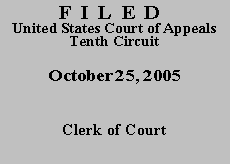

| CAESAR C. LATIMER,
Plaintiff-Appellant, v. TULSA RETIREMENT BOARD OF TRUSTEES, Sued as: Tulsa County Retirement Board of Trustees; TULSA COUNTY BOARD OF COUNTY COMMISSIONERS, Sued as: Tulsa County Board of Commissioners, Defendants-Appellees. |
|
Caesar Latimer, an attorney proceeding pro se, appeals the district court's dismissal of his 42 U.S.C. § 1983 complaint as time-barred. We have jurisdiction under 28 U.S.C. § 1291, and we affirm.
I
Mr. Latimer, an African-American male, was employed by Tulsa County as an assistant county attorney from 1956 to 1968. In 1965, the county implemented a retirement system that required at least fifteen years of service for eligibility for benefits. In 1974, though, the Tulsa County Board of County Commissioners adopted a resolution that only those employees who were contributing to the retirement fund on March 6, 1974, would be allowed to count pre-system periods of service (i.e., service prior to 1965) to establish eligibility for retirement benefits. Because his employment ended in 1968, Mr. Latimer was not contributing to the retirement fund on March 6, 1974.
In 1996, Mr. Latimer applied for retirement benefits based on a combination of his county service and military service. The Board of Trustees denied his application for benefits on September 24, 1996, and the County Employees Retirement Board confirmed the denial of benefits by letter dated December 3, 1996. The denial was based on the 1974 resolution, which allowed Mr. Latimer credit only for his service between 1965 and 1968, rather than his entire term of service. This was the first time Mr. Latimer learned of the 1974 resolution. Mr. Latimer contends that he was the only person adversely affected by the 1974 resolution, and that it was passed specifically to deny him retirement benefits because of racial animus.
Mr. Latimer first pursued relief in the Oklahoma court system. After the Oklahoma district court for Tulsa County granted summary judgment against him on his claims (including § 1983 claims), he filed his § 1983 complaint in the federal district court on December 21, 2001. Finding the complaint time-barred under the two-year statute of limitations applicable to § 1983 actions brought in Oklahoma, the district court granted defendants' motion for summary judgment and dismissed all claims. Mr. Latimer appeals.
II
On appeal, Mr. Latimer raises a number of merits arguments. Because the district court dismissed on limitations grounds, however, we need only address his arguments relating to the statute of limitations.
Looking at the record in the light most favorable to Mr. Latimer as the non-moving party, Mr. Latimer had actual knowledge of the 1974 resolution and its effect on his retirement benefits on or about September 24, 1996, when the Board of Trustees denied his application for benefits, or, at the latest, on or about December 3, 1996, when the County Employees Retirement Board confirmed the denial. Yet his federal suit was filed more than five years later, on December 21, 2001. The statute of limitations for 42 U.S.C. § 1983 claims arising in Oklahoma is two years. See Meade v. Grubbs, 841 F.2d 1512, 1524 (10th Cir. 1988). Consequently, Mr. Latimer's federal suit was untimely.
On appeal, Mr. Latimer states that he believed he should resort to the Oklahoma courts before the federal courts. But the federal courts and the state courts each have jurisdiction to hear § 1983 claims, see Carter v. City of Emporia, 815 F.2d 617, 621 (10th Cir. 1987), and Mr. Latimer was not required to approach the state courts before bringing a federal lawsuit, see Pittsburg County Rural Water Dist. No. 7 v. City of McAlester, 358 F.3d 694, 710 (10th Cir.), cert. denied, 125 S. Ct. 44 (2004).
Mr. Latimer further argues that the appropriate statute of limitations should be considered under a "continuous violation" theory akin to actions under Title VII of the Civil Rights Act of 1964 (an indefinite period) or the Oklahoma limitations period for contract claims (five years). There is no support for either contention. It is well-settled that the two-year statute of limitation applies to § 1983 claims in Oklahoma. See Meade, 841 F.2d at 1524. Moreover, even assuming that a continuing violation theory would be applicable, the 1974 resolution more resembles a discrete act of alleged discrimination and denial of due process than a continuing violation. And Oklahoma's contract limitations period does not avail Mr. Latimer, as his federal complaint was filed more than five years after the retirement board's December 3, 1996, letter, the latest point at which Mr. Latimer must have had actual notice of the 1974 resolution.
Finally, Mr. Latimer argues that the limitations period should be equitably tolled. He points out that he had no knowledge of the 1974 Act until 1996. His argument, however, fails to identify any factors that would support tolling any part of the period between December 3, 1996, and December 21, 2001.
III
Mr. Latimer's federal action was brought after the expiration of the applicable statute of limitations. The district court's dismissal of Mr. Latimer's complaint as untimely is AFFIRMED. Defendants' request for an award of costs and fees is DENIED under Fed. R. App. P. 38, as it is not in a separately filed document, but defendants remain free to request that costs be taxed under Fed. R. App. P. 39. The mandate shall issue forthwith.
Entered for the Court
Circuit Judge
*. This order and judgment is not binding precedent, except under the doctrines of law of the case, res judicata, and collateral estoppel. The court generally disfavors the citation of orders and judgments; nevertheless, an order and judgment may be cited under the terms and conditions of 10th Cir. R. 36.3.